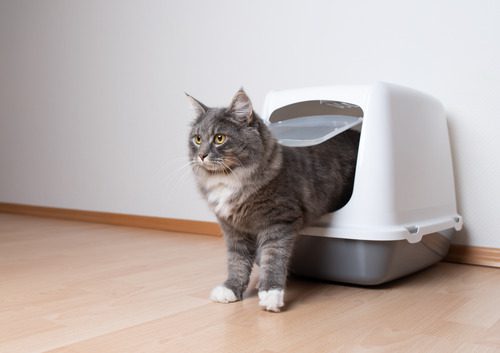Blood in Cat Urine
Finding blood in your cat’s urine can be alarming, and it’s important to understand the potential causes and necessary steps to address this issue. This article will explore why blood might appear in your cat’s urine, the symptoms to watch for, diagnostic methods, and when to seek veterinary help. If you’re in Silver Spring, MD, and your pet requires emergency care or a specialty consultation, contact Apex Vets today.

Potential Causes of Blood in Cat Urine
Hematuria, or blood in the urine, can result from various underlying conditions. Some common causes include:
- Urinary Tract Infections (UTIs): Bacterial infections can cause inflammation and bleeding in the urinary tract.
- Bladder Stones: These can cause irritation and bleeding within the bladder.
- Feline Lower Urinary Tract Disease (FLUTD): A group of disorders affecting the bladder and urethra, leading to blood in the urine.
- Trauma: Physical injury to the bladder or urinary tract can result in hematuria.
- Tumors: Bladder or urinary tract tumors can cause bleeding.
- Idiopathic Cystitis: Inflammation of the bladder without a clear cause, often stress-related.
What Are Some Symptoms of Hematuria?
Besides visible blood in the urine, other symptoms might indicate an underlying issue. These symptoms include:
- Frequent urination
- Difficulty or pain during urination
- Licking the genital area
- Changes in behavior
- Uncontrolled urination or accidents outside the litter box
Diagnosing the Cause of Blood in Cat Urine
The veterinarians at Apex Vets use diagnostic tools such as imaging or blood tests to determine the cause of hematuria. These tests will check for any issues or indications of an underlying condition in various parts of your pet’s body.
Treatment Options for Hematuria
Medical Treatments
The treatment for hematuria depends on the underlying cause. Some treatments include antibiotics for bacterial infections, dietary changes to dissolve bladder stones or prevent their formation, and medication to relieve pain or reduce symptoms.
Surgical Interventions
In some cases, surgery might be necessary, especially for removing bladder stones or tumors. Your veterinarian will discuss the best surgical options if needed.
Preventing Blood in Cat Urine
You can help reduce the risk of blood appearing in your cat’s urine by taking these preventive measures:
- Schedule wellness exams to ensure regular screenings and tests to detect early signs of urinary issues.
- Discuss any changes in behavior, urination patterns, or overall health with your veterinarian.
- Provide a balanced diet tailored to your cat’s specific needs.
- Feed wet food to increase water intake and help flush the urinary tract.
- Ensure access to fresh, clean water at all times.
- Provide a calm, stable environment with interactive toys, regular playtime, and quiet resting areas to reduce stress.
- Consider using pheromone diffusers or anxiety-relieving medications if needed.
Keeping Your Cat Healthy and Happy
By recognizing symptoms early and seeking veterinary care, you can ensure your cat remains healthy and comfortable. Prompt medical intervention can prevent further complications and ensure your cat receives the necessary care. If you’re in Silver Spring, MD, and your pet requires emergency care or a specialty consultation, contact Apex Vets today.
